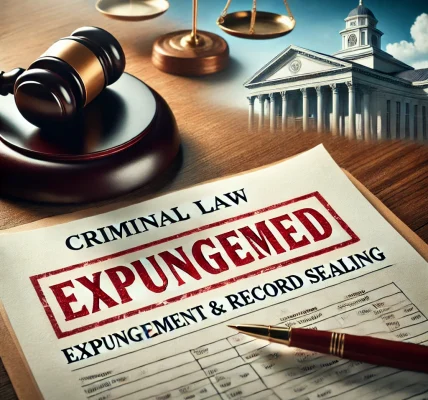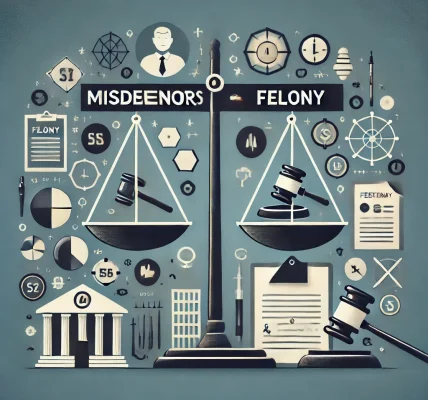Introduction
When facing criminal charges, understanding the distinction between misdemeanors and felonies is crucial. These classifications impact the severity of penalties, legal proceedings, and long-term consequences. Whether you are a defendant, a concerned family member, or simply interested in criminal law, knowing the differences can help in navigating the legal system effectively. This article provides an in-depth review of misdemeanors and felonies, their key differences, legal implications, and potential defenses.
What is a Misdemeanor?
A misdemeanor is a less severe criminal offense compared to a felony. These offenses typically involve minor harm or low-level criminal activity. While punishments for misdemeanors can include jail time, fines, probation, or community service, they are generally less severe than those for felonies.
Common Examples of Misdemeanors
- Petty Theft – Stealing items of low value
- Public Intoxication – Being visibly drunk in public
- Simple Assault – Physical attack without severe injury
- Trespassing – Entering private property without permission
- Vandalism – Minor property damage such as graffiti
- Disorderly Conduct – Disturbing the peace or behaving in an unruly manner
Punishments for Misdemeanors
Misdemeanor penalties vary by state but typically include:
- Jail time up to one year (served in county jail, not state prison)
- Fines, often ranging from a few hundred to several thousand dollars
- Probation or mandatory community service
- Temporary loss of certain rights (e.g., firearm possession, driving privileges)
What is a Felony?
Felonies are the most serious crimes under U.S. law. They typically involve significant harm to individuals or society and carry severe penalties, including long-term imprisonment. A felony conviction can have life-altering consequences, affecting employment, housing, and civil rights.
Common Examples of Felonies
- Murder – Intentionally causing another person’s death
- Rape or Sexual Assault – Non-consensual sexual contact
- Armed Robbery – Using a weapon to steal from someone
- Drug Trafficking – Selling or distributing illegal drugs
- Kidnapping – Unlawfully taking and holding a person against their will
- Grand Theft – Stealing property of significant value
- Burglary – Illegally entering a structure with intent to commit a crime
Punishments for Felonies
Felony sentences depend on the severity of the crime and jurisdiction but often include:
- Imprisonment – Sentences range from one year to life in prison (or even the death penalty in some states)
- Hefty fines, often exceeding tens of thousands of dollars
- Probation or parole after serving a prison sentence
- Loss of rights, such as voting, firearm ownership, or professional licenses
- Long-term criminal record impact, making it difficult to find employment or housing
Key Differences Between Misdemeanors and Felonies
| Feature | Misdemeanor | Felony |
|---|---|---|
| Severity | Less serious | More serious |
| Punishment | Jail time (up to 1 year), fines, probation | Prison time (over 1 year), heavy fines, parole restrictions |
| Examples | Petty theft, trespassing, disorderly conduct | Murder, robbery, drug trafficking |
| Long-Term Impact | Minor criminal record effects | Major criminal record effects (e.g., loss of voting rights, difficulty finding jobs) |
| Legal Proceedings | Often handled in lower courts | Handled in higher courts with stricter procedures |
Legal Defenses for Criminal Charges
Regardless of whether you face misdemeanor or felony charges, certain legal defenses may help reduce or dismiss charges. Common defenses include:
- Lack of Intent – Proving the act was accidental or unintentional
- Self-Defense – Justifying actions taken in protection against harm
- Alibi – Providing evidence that you were not present at the crime scene
- Insufficient Evidence – Challenging the prosecution’s lack of solid proof
- Mistaken Identity – Showing that authorities misidentified the suspect
- Violation of Rights – Arguing against unlawful searches, interrogations, or lack of due process
How a Criminal Record Affects Your Future
A criminal conviction, whether for a misdemeanor or felony, can have lasting consequences. Some key concerns include:
- Employment Difficulties – Many employers conduct background checks
- Housing Challenges – Landlords may refuse to rent to individuals with a record
- Professional Licensing Issues – Certain jobs require a clean record
- Immigration Consequences – Non-citizens may face deportation
Expungement or record sealing might be an option in some cases, especially for misdemeanors. Consulting with a qualified criminal defense attorney can help determine eligibility for clearing your record.
Conclusion
Understanding the difference between misdemeanors and felonies is essential for anyone involved in the criminal justice system. While misdemeanors carry lighter penalties, felonies result in serious legal consequences that can impact a person’s future. If you or someone you know is facing criminal charges, seeking professional legal counsel is highly recommended. Staying informed and knowing your rights can make a significant difference in navigating the legal landscape effectively.



